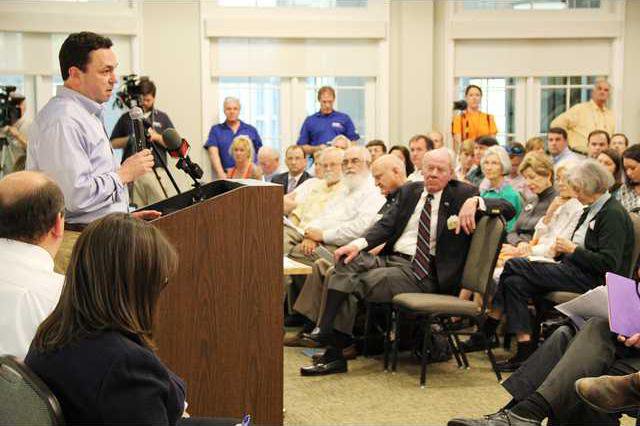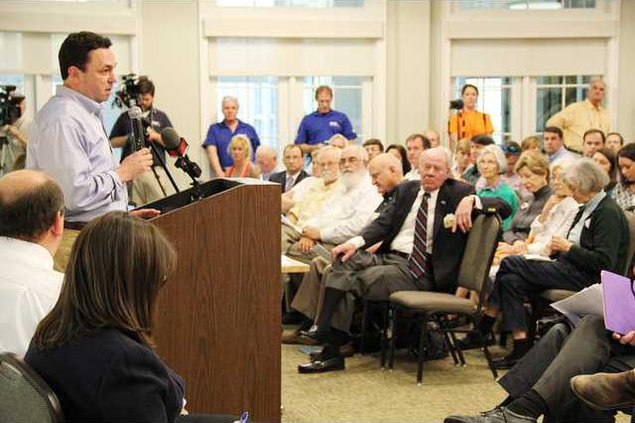RICHMOND HILL—Allen Fore, Kinder Morgan’s vice president of public affairs, was the first to speak at Tuesday’s public hearing at the Richmond Hill City Center regarding the company’s proposed Palmetto Pipeline Project.
That was the last positive spin the 360-mile pipeline got for most of the rest of the night.
Speaker after speaker stood up before a packed room to voice opposition to the pipeline and Kinder Morgan’s application to the Georgia Department of Transportation for a certificate of necessity and convenience.
The DOT said 528 people showed up at the hearing, and the agency will hold another hearing May 7 in Waynesboro. It also will take written comments through May 15.
If granted, the certificate will allow Kinder Morgan to use eminent domain to force property owners along the pipeline route to sell the company easements if they do not first come to a negotiated agreement.
That’s something the company rarely uses, Fore said, and even then landowners are compensated.
But even as he was speaking, it was clear this wasn’t Kinder Morgan’s night.
Many of those who spoke Tuesday, including Richmond Hill resident Roy Hubbard, railed against the company behind the pipeline after asking why Georgia DOT Commissioner Russell McMurray is the only person to decide whether Kinder Morgan would get the certificate.
“I have every respect for Commissioner McMurray’s long service for the Georgia DOT,” Hubbard said. “In my opinion, he should not be shouldered with the responsibility in deciding whether or not to apply such an invasive and potentially damaging rule such as the rule of eminent domain. There are 14 members on the DOT board. At the very least, they should be involved in the process. And certainly our elected representatives should be involved in the process.”
Hubbard went on to link Kinder Morgan Chairman and CEO Richard Kinder to failed energy trading company Enron, where Kinder once was chief operating officer. Hubbard also ran through a list of lawsuits Kinder’s current company is facing, but not before blistering the application process itself.
“We are talking about Georgia government officials jumping through hoops for a Texas billionaire who wants to take private property from Georgia citizens for his own personal gain, and the idea is actually being considered,” said Hubbard, one of more than 30 to speak out against the project.
Some who spoke out were attorneys. One speaker was Billy Morris, the founder, chairman and CEO of Morris Communications Co., which owns the Savannah Morning News, Augusta Chronicle and Florida Times-Union among other newspapers.
He was against it.
A number of those who spoke against the pipeline were environmentalists, and Riverkeepers for just about every river on the coast stood up to speak. Others didn’t identify themselves as such, including St. Simons resident Lisa Norton, who said she had attended a previous meeting on the pipeline sponsored by Kinder Morgan.
Norton said the company initially provided maps that didn’t have some of area’s rivers on them, and she thought the company should disclose who will be using the pipeline.
But she saved her strongest words for the company’s attempt to push the pipeline through, and fired a shot at public officials as well.
“My interpretation of this is legal thievery,” Norton said. “We may not be able to sue the state under sovereign immunity, but by God those public servants are liable, and I hope they hear what we’ve got to say today because they’re fair game if the people of Georgia don’t start being represented in this democratic process.”
Distrust in Kinder Morgan’s aims almost seemed to go hand-in-hand with a similar distrust of government.








